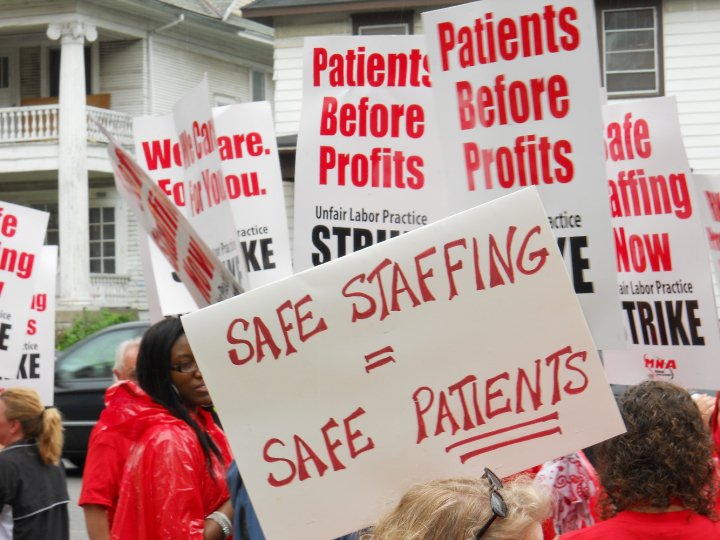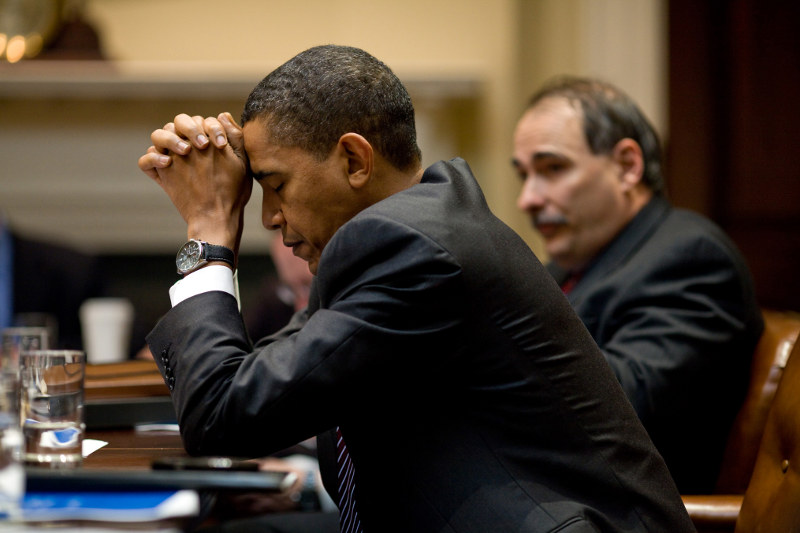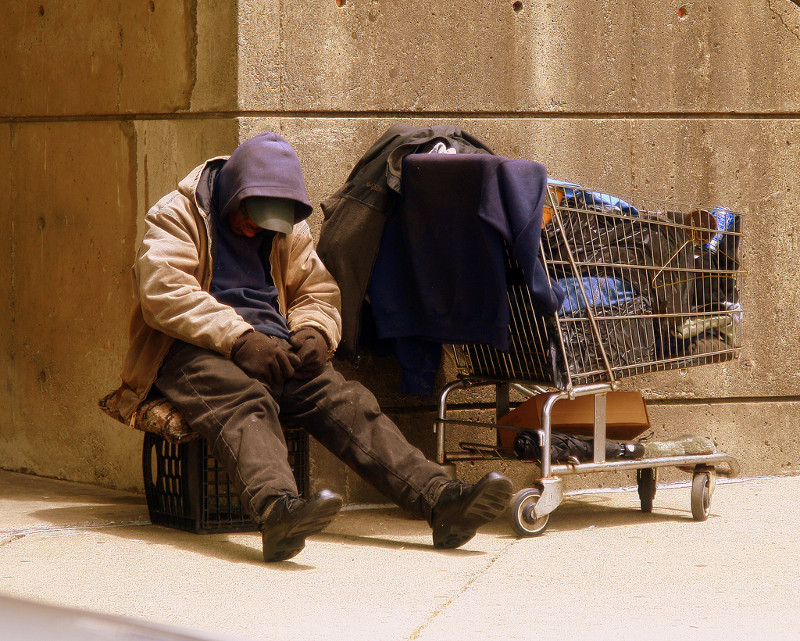“Please wake me up when the recession is over.” This sentiment, expressed on a T-shirt, sums up the mood of many American workers. They are anxious for what they assume to be a temporary disruption in the “normal” course of their lives to be over. Unfortunately, this is the new “American Dream,” a living nightmare of stress and constant insecurity, of unemployment and homelessness.
Month after month we are told that the economy is getting better, and yet the jobs have yet to materialize. The 3.9% rise in GDP in the first three months of 2010 is not enough to make a dent in the jobless rate. That would be respectable for capitalism during “normal” times, but for a country recovering from deep recession, it’s not nearly enough.
Economists say it takes about 3% growth in GDP to create enough jobs just to keep up with population growth. So growth would have to be about 5% for a full year to drive the unemployment rate down by 1 percentage point. After the last severe recession in the early 1980s, the economy grew at a rate of 7 to 9 percent for 15 months straight, and the unemployment rate dropped from 10.8 percent to 7.2 percent in 18 months. That’s simply not in the cards this time around. Nearly half of the nation’s 15 million unemployed have been out of work for more than 26 weeks, never mind the under-employed who can’t find decent full time work.
But it’s not just unemployment, drained savings, ruined retirement accounts, home and business foreclosures, and shattered dreams. Directly and indirectly, the burden of paying for the crisis is being shifted by the federal government to the states and municipalities. Plenty of workers’ tax money was available to bail out the banks, insurance companies and investment firms, but there is very little to help out those of us who created that wealth in the first place. These cuts have been going on for years, as the rich have chipped away at what little is left of social services and increasingly attacked public sector workers. But they are now set to intensify.
Thirty-two states are now officially bankrupt, with California, Michigan, and New York hit the hardest. According to the Center on Budget and Policy Priorities (CBPP), state governments face a combined deficit of some $375 billion in 2010-2011. At least 45 states have dramatically cut health, education and social services for the poor, and 30 have imposed higher sales taxes and other fees. Forty-two states have laid off, furloughed, or not rehired new workers when others retire. Since August 2008, state and local governments have eliminated 192,000 jobs.
This means that even the limited safety net that remains after Reagan, Bush Sr. and Clinton began dismantling it, is now being taken away, just when people need it most.
As Bob Herbert of the New York Times put it:
“A story that is not getting nearly enough attention is the ruinous fiscal meltdown occurring in state after state, all across the country. Taxes are being raised. Draconian cuts in services are being made. Public employees are being fired. The tissue-thin national economic recovery is being undermined. And in many cases, the most vulnerable populations -- the sick, the elderly, the young and the poor -- are getting badly hurt.”
The teachers and their unions are a prime target. For years, school districts have cut staff, privatized through the use of charter schools, dismantled the unions, increased classroom sizes, and cut curriculum and “electives” like music and art, etc. Now they need to come directly after teachers’ and other education workers’ salaries. But there is growing pressure from the rank and file on the union leaders to do something, and not just among teachers.
 Nurses on strike in Minnesota These attacks will inevitably lead to open explosions of the class struggle in one sector of the working class after another. Strike levels may be at historic lows, but that only means that there is no way for them to go but up. Already, that is starting to change. Nurses in Minnesota, Spirit Airlines pilots, Boeing workers, and others have either gone on strike in recent weeks or are likely to do so in the near future. The modest improvement in the economy, at least on paper, can serve to embolden workers to fight to fight against concessions and for a just increase in their quality of life.
Nurses on strike in Minnesota These attacks will inevitably lead to open explosions of the class struggle in one sector of the working class after another. Strike levels may be at historic lows, but that only means that there is no way for them to go but up. Already, that is starting to change. Nurses in Minnesota, Spirit Airlines pilots, Boeing workers, and others have either gone on strike in recent weeks or are likely to do so in the near future. The modest improvement in the economy, at least on paper, can serve to embolden workers to fight to fight against concessions and for a just increase in their quality of life.
The workers will say to themselves: “We have borne the brunt of the crisis, and now that you say things are getting better, you want us to give up even more in concessions?” If you know anything about the traditions and temperament of the American working class, there are limits to how much they will take before they start “taking names.” Nonetheless, the bosses will resist this tooth and nail. They will continue to use the crisis to hammer away at the semi-civilized conditions of life we have conquered through struggle in the past. However, in society as in nature, similar conditions lead to similar results. If you want to get an idea of what is to come at a certain stage here in the U.S., you need only look at the situation across the Atlantic.
In Europe, we see the same kinds of attacks in an even more blatant form. In Greece, Portugal, Spain, Ireland, Italy, the UK and across the EU, cuts and austerity measures are on the order of the day. But so too is a massive working class backlash. The mass protests and general strikes in Greece are just the beginning.
Here in the U.S., we are suffering the same kinds of attacks, although on the surface it may not seem quite as blatant. The mechanism is obscured by our Federal / State structure. Federal cuts “trickle down” in the form of cuts to subsidies to states, cities, and municipalities. But make no mistake, the ongoing cuts in low-income assistance programs, public sector wages, pensions, and benefits are all a result of the crisis U.S. capitalism is facing as a whole, not just fiscal problems in this or that state or city.
Already we have seen mass rallies and protests of public sector workers in several states. The tremendous movement of California students last Fall and this Spring is another example of things to come, as Americans increasingly realize that this is the new “normality.”
 Oil spill in the gulf. Photo by New Orleans Lady. The disaster in the Gulf is yet another tragic reminder that capitalism, a system based on the exploitation of natural resources and the labor of the majority, in the pursuit of super profits for a tiny minority, can no longer play a progressive role in improving humanity’s quality of life. When Katrina and its aftermath shattered New Orleans, many blamed Bush personally, and the Republicans in general, for their callous and profit-motivated attitude toward the residents of the Gulf Coast. Now Obama has his own “Katrina,” and the long-term effects may be even more devastating. The Obama administration’s response has been equally inept and callous, despite the much nicer rhetoric and empathetic words and promises.
Oil spill in the gulf. Photo by New Orleans Lady. The disaster in the Gulf is yet another tragic reminder that capitalism, a system based on the exploitation of natural resources and the labor of the majority, in the pursuit of super profits for a tiny minority, can no longer play a progressive role in improving humanity’s quality of life. When Katrina and its aftermath shattered New Orleans, many blamed Bush personally, and the Republicans in general, for their callous and profit-motivated attitude toward the residents of the Gulf Coast. Now Obama has his own “Katrina,” and the long-term effects may be even more devastating. The Obama administration’s response has been equally inept and callous, despite the much nicer rhetoric and empathetic words and promises.
As for BP, their corner-cutting-in-the-name-of-profitability is nothing unique to them or for Big Business generally, they just got unlucky in a big way. They were more than happy to “drill, baby drill!” to make mega-profits, but they did not have the sufficient preparations to deal with a disaster of this magnitude. Here’s where the government steps in. Sort of. The Democrat-controlled government, instead of taking over the well capping and clean up operations and seizing BP’s U.S. assets to pay for the mess, halfheartedly “encouraged” BP to do this or that and set up a modest escrow account to cover some future legal claims against the oil giant. The reason for this is clear. Only the U.S. government has the resources and power to decisively change the course of this disaster. But to demonstrate in practice that the state is more effective at operating in the public interest than private enterprise is something the pro-capitalist Obama administration wants to avoid at all costs. Sure, they stepped in boldly to bail out the banks and save their pals at Goldman Sachs, but when it comes to the millions of Gulf Coast residents and the environment, forget about it. The real problem is not the Republicans or the Democrats, but the capitalist system itself, which both those parties defend.
This is why nationalization of the entire oil industry, under democratic public control, is the only solution that can truly begin to solve this crisis and avoid new ones in the future. If the public had direct input and control over the industry, you can be sure a lot more safeguards would be put in place to protect workers’ lives and the environment.
 Foto Oficial de la Casa Blanca por Pete Souza. With the midterm elections just a few months away, many Americans are frustrated and looking for a way out. Their genuine hope for change under Obama hasn’t been realized. Obama still tries to present himself as an “outsider” to Washington, when he is actually the biggest “insider” in recent history. Voters are clearly frustrated with the vast majority of incumbents, as evidenced in recent special elections. Congressional Democrats have an approval of just 37%, while Republicans score even lower at 31%. Interestingly, while the Democrats used to be much more favored to “fix the economy,” they have lost a lot of ground, but not necessarily because people think the Republicans can do any better. After raising record amounts of money in 2008, the Democrats’ coffers are now much weaker.
Foto Oficial de la Casa Blanca por Pete Souza. With the midterm elections just a few months away, many Americans are frustrated and looking for a way out. Their genuine hope for change under Obama hasn’t been realized. Obama still tries to present himself as an “outsider” to Washington, when he is actually the biggest “insider” in recent history. Voters are clearly frustrated with the vast majority of incumbents, as evidenced in recent special elections. Congressional Democrats have an approval of just 37%, while Republicans score even lower at 31%. Interestingly, while the Democrats used to be much more favored to “fix the economy,” they have lost a lot of ground, but not necessarily because people think the Republicans can do any better. After raising record amounts of money in 2008, the Democrats’ coffers are now much weaker.
In these conditions, independent labor candidates, running against both Democrats and Republicans could get a massive echo, and lay the foundation for a mass party of labor. As we have reported previously, in North Carolina and Pennsylvania, modest efforts have already been initiated in this direction. This is an indication of things to come.
As Alan Woods explained in a recent article on The New Stage in the Capitalist Crisis:
“The present situation is complex and contradictory, but this is only a way of expressing the transitional nature of the period, which contains elements from the past, which are struggling with elements of the new period. The old ideas and prejudices will not easily be eliminated. They are tenacious and deeply rooted in the psychology of the masses. Great events will be needed to shake up the masses to the point where they are ready to break with the old ideas and embrace new ones.”
Democrats and Republicans tell us that we are all in this together, that we all have to “tighten our belts” to make it through the crisis to the better days ahead. But under capitalism, better days are not ahead, and we are definitely not all in this together. The rich are doing just dandy and are actually richer than before the crisis began; they have used it to concentrate even more wealth in their hands at our expense. This is the simple truth. This is the best capitalism has to offer. But more and more Americans are starting to realize that capitalism’s best isn’t good enough. It’s high time we tried something else: socialism.
Source: Socialist Appeal (USA)

